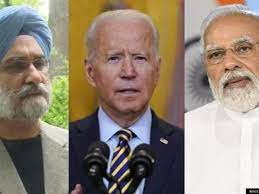WASHINGTON, Oct 30: The relationship between India and the US has grown steadily in substance and the convergence in the Indo-Pacific has given a new momentum to the bilateral strategic partnership, the Indian envoy here has said.
The remarks by Taranjit Singh Sandhu, India’s Ambassador to the US, came during a keynote address at the ‘India at 75′ Conference at the School of International and Public Affairs, Columbia University on Saturday.
In his address, Sandhu said that the frequent engagements between Prime Minister Narendra Modi and US President Joe Biden and consultations at the ministerial and senior levels have provided overall direction to the relationship.
“We have been making efforts to implement the vision of our leadership. Our bilateral relationship has grown steadily in substance,” he said.
“Our strategic partnership has got a new momentum with the convergence in the Indo-Pacific; through Quad, IPEF (Indo-Pacific Economic Framework) and I2U2,” he said
In November 2017, the US, Australia, India and Japan gave shape to the long-pending proposal of setting up the four-nation Quad grouping to develop a new strategy to keep the critical sea routes in the Indo-Pacific free of any influence, amid China’s growing military presence in the strategic region.
China claims nearly all of the disputed South China Sea, though Taiwan, the Philippines, Brunei, Malaysia and Vietnam all claim parts of it. Beijing has built artificial islands and military installations in the South China Sea. China also has territorial disputes with Japan in the East China Sea.
The IPEF was launched jointly by the US and other partner countries of the Indo-Pacific region on May 23 in Tokyo. The 14 members of the IPEF are — Australia, Brunei, Fiji, India, Indonesia, Japan, Korea, Malaysia, New Zealand, Philippines, Singapore, Thailand, Vietnam and the US.
It seeks to strengthen economic partnerships among participating countries to enhance resilience, sustainability, inclusiveness, economic growth, fairness and competitiveness in the region.
The I2U2 – comprising India, Israel, the UAE and the US – was established in October 2021.
The grouping aims to cooperate on joint investments and new initiatives in water, energy, transportation, space, health, and food security.
“Beyond the political level, it is the everyday connections between people; businesses; researchers; scholars; all of you here in this room which create the foundations for a thriving partnership,” Sandhu said.
He said the relationship between India and the US is defined by three S – scale, speed and skills.
“To give an example under the longstanding Vaccine Action Programme, India and the US jointly developed the ROTAVAC vaccine against rotavirus. The cost of the vaccine went down from USD 60 to USD 1,” Sandhu said.
More recently, the Covid vaccine partnership story is no different, he said.
“A closer India-US relationship is in the interest of the world. So the scale,” he added.
“Two: Here is a relationship, which is people-driven and people-centric. Our real success is measured by how quickly and how effectively as governments we are able to match the expectations of the people. The South Block and the C Street or Pennsylvania Avenue are always trying to catch up with people’s dreams and aspirations. So the speed,” Sandhu said.
Talking about skills, he said India’s four million plus diaspora in the US and more than 200,000 Indian students in the country act as strong anchors of the bilateral relationship.
“They are force multipliers. They also come with substantial skill sets. I feel they make our relationship smart in the true sense. So the skills,” said the Ambassador. (PTI)
Home International Convergence in Indo-Pacific gave new momentum to India-US strategic partnership: Amb Sandhu


